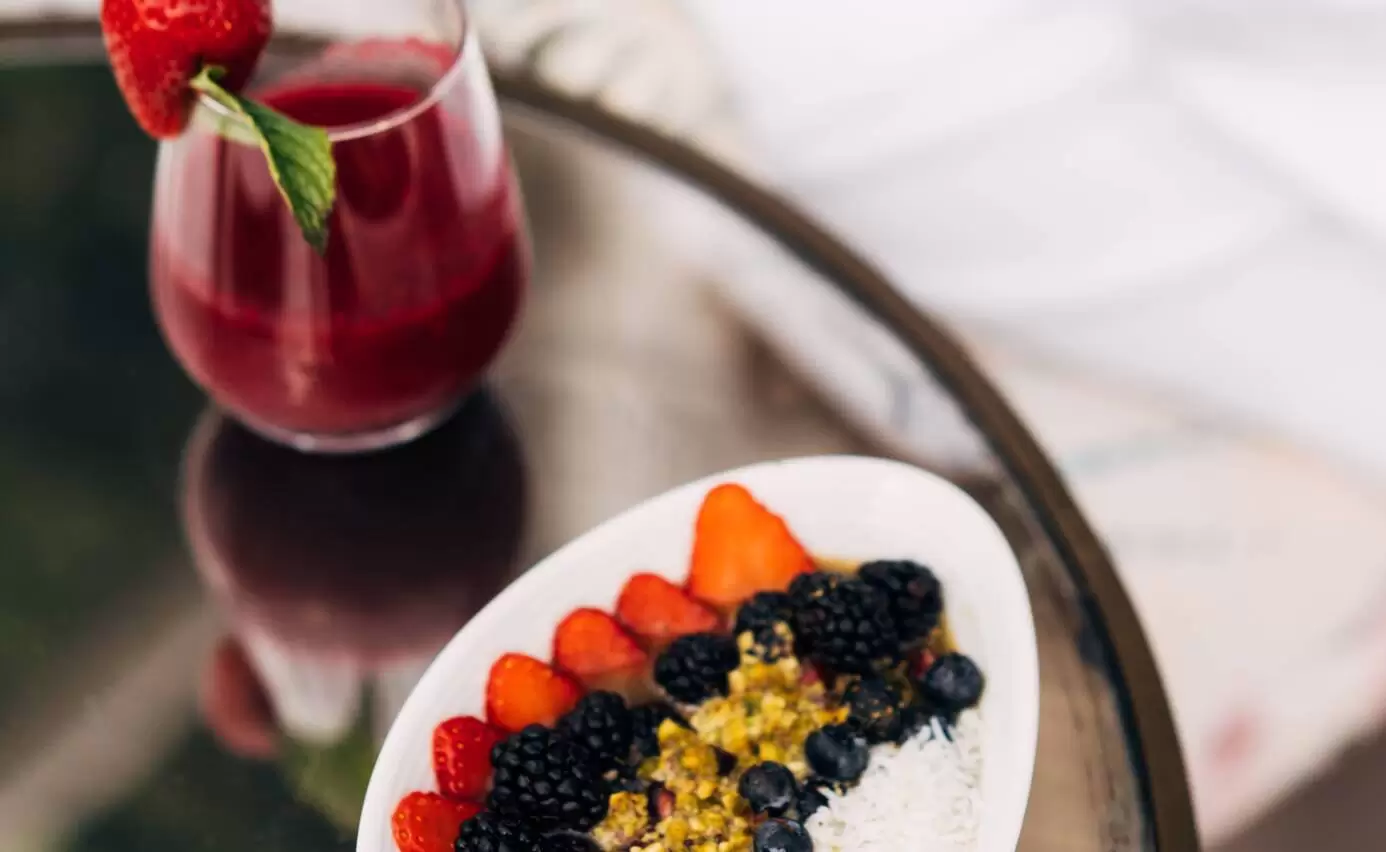Nourish your body
Healthy diets and lifestyles have been at the forefront of modern life in the last few years with more and more products being advertised to us, in particular snacks and small meals. But what is really right for us? What is really going to help our bodies?
Here we take you through the best healthy snacks available to you, all of which are natural and easy to find. You won’t find any magic pills or luminous green edible energy gels here, just healthy, pure ingredients that you should be including in your diet.
Healthy snack alternatives
It can be confusing to know what to eat, but Laura Agar Wilson from Whole Heartedly Healthy offered her views on what constitutes a healthy snack:
“A healthy snack is something that isn't too sugary and includes some healthy fat and protein to help keep you full. A piece of fresh fruit with a handful of nuts, some yoghurt topped with berries or some hummus with vegetable crudités would all make great snacks.”
For some time snacking was considered to be an unhealthy habit, something that was reserved for younger children between cartoons and meals to keep them quiet. Now, that couldn’t be further from the truth, as Barron Rosborough from Snacknation explains:
“Snacking isn't a bad thing. Too many people try to avoid it, but if you choose healthy options in moderation, snacks can sustain you until your next meal, help you curb cravings and manage portion size.”
It has now become a certified part of any healthy diet, adopted by athletes and fitness enthusiasts the world over, as Barron goes onto prove:
“An often overlooked part of the balanced diet is snacking. A USDA study surveying adults from 2007-2008 found that nearly two-thirds of adults snack at least two or more times a day - rising to 3-4 times per day for millennials.”
Your body constantly needs fuel to function at an optimal level. If your breakfast is at 7.00am and you have to wait until 1.00pm for your next meal, your output is going to seriously suffer, as will your mood and performance.
Crisps
Crisps are a staple of lunchboxes and 3.00pm snack times and even though companies have made significant strides in reducing the unhealthy ingredients, there are still healthier alternatives out there to try.
Kale Crisps
High in fibre and iron, kale has become one of the most popular vegetables out there.
If you head for the bag of home-made kale crisps rather than the potato-based alternative, you will be consuming around 30 percent less starchy carbs, as well as adding the benefit of eating one of the most nutrient-dense foods available.
Kale crisps are awfully easy to create and like the regular potato version, can be made to taste. By cooking them for a few minutes in a hot oven you can add spices and flavours to taste. Why not sprinkle some paprika and cayenne pepper on top for an added fat-fighting kick?
Nuts and seeds
Mother Nature has blessed us with a selection of bitesize morsels packed full of healthy fats, fibre and protein. When it comes to nuts, you have a great selection of tastes, sizes and benefits that make them a welcome addition to your healthy snack hamper.
Walnuts
Containing the amino acid l-arginine, walnuts are great for anyone suffering with heart disease and eating them can help to ease the risk of both prostate and breast cancer.
Walnuts are crammed full of antioxidants, which are crucial for good health, while also helping you to combat the aging process and slowing any age-related deterioration.
Packing neuroprotective compounds like vitamin E, melatonin and omega-3 fats, the walnut’s composition has been shown to support a good brain health.
Almonds
Almonds are some of the most nutritionally beneficial seeds available. Packed full of antioxidants, almonds help protect against oxidative stress which contributes to aging and diseases like cancer.
To take in the most health benefits, opt for almonds with the skin on – this is where most of the antioxidants are found.
These little seeds are one of the best sources of vitamin E amongst any type of food available, with one ounce providing 37 per cent of your daily intake.
Pistachios
Don’t be put off by the shells; pistachios offer a bounty of nutritional benefits.
One ounce accounts for around 160 calories, but offers a great source of protein, fibre, energy-boosting B vitamins and monounsaturated fats which will help tackle your cholesterol.
Eating shelled pistachios helps to stave off mindless overeating and scientists at Eastern Illinois University found that by having to break open the shells, you are likely to consume 41 percent less calories than pre-shelled nuts.
By adding pistachios to any carbohydrate-rich meals means that you can reduce the spike in blood sugar that you get post-meal.
Berries
Packed full of antioxidants, berries are widely considered to be one of the healthiest foods you can eat. Like nuts, the variety offers itself to almost everyone and their vibrant colours make them appealing to both the eyes and stomach.
Blueberries
Blueberries have become one of the most popular berries available, courtesy of how few a calories they have compared to the positive nutrients they offer.
High in fibre, vitamins C and K as well as Manganese, 85% of the berry is actually water, meaning that a cup will only cost you around 80 calories.
Blueberries are officially royalty in the antioxidant world, having the highest capacity of all fruits and vegetables.
Fighting the aging process, these little berries reduce any DNA damage that your body may have suffered which will protect you against cancer in the future.
Acai Berries
Indigenous to the Amazon, the acai berry was at the forefront of the superfood revolution that has consumed the food market over the last few years. But its health benefits date back hundreds of years, having been celebrated for its healing, energy-boosting and immune strengthening powers.
In the Journal of Agricultural and Food Chemistry, research pointed out that consuming the acai berry leads to oxidative damage repair and suppression.
Good for your outside as much as your inside, the acai berry is another healthy snack alternative that will help fight the effects of aging thanks to its high levels of phytochemicals, the berry has also proven to help not just digestion but also weight loss.
While it can be an aid for anyone looking to lose weight, it helps to maintain a healthy weight.
Goji Berries
Brimming with fibre, iron, zinc, vitamins A and C and those invaluable antioxidants, goji berries originate from China, where the plant has been used for medicinal purposes for hundreds of years.
Used by many to treat eye, liver and kidney ailments, the ‘wolfberry’ has a slightly sour taste and is often found in a dried out form – like raisins.
Before adding goji berries to your diet as a healthy snack option, you should consult your doctor if you suffer from low blood sugar, low or high blood pressure, if you’re breastfeeding, pregnant or using blood thinners.
Like the acai, goji berries are also proven to help boost the immune system as well as helping in the weight loss effort thanks to their high fibre content.
A study examined the effects of the goji berry on a person’s well-being, visual acuity and more. It found that the subjects who consumed goji berry juice over a 14 day period reported increases in their energy, athletic performance, calmness, quality of sleep, focus and overall well-being.
Protein
Protein comes in many shapes and sizes. The purest and certainly healthiest forms of protein come from meat-based substances such as chicken, beef and fish, as well as yoghurt and cheese.
Yoghurt
Yoghurts are a minefield of fat, sugars and flavours. Your eyes are often disorientated by the array of colours and tastes on offer in the shopping aisle, but it is important to go for plain Greek yoghurt for the best snack.
In a single cup of yoghurt you can get around 23 grams of protein which is low in fat and sugar.
It is such a durable snack that can be added to almost anything, or crammed full of nuts, berries and seeds to add extra texture and taste.
Not only will your bones receive vitally important calcium, your gut will also benefit from the probiotic bacteria.
Alternatively, you can opt for Icelandic yoghurt. Your eyes and stomach will think you’re digging into a dessert thanks to its thick, creamy texture when really you are consuming a gut-friendly snack that contains even more protein than its Mediterranean cousin.
Traditionally named skyr, it is made by straining away excess liquid, which leaves behind this thick treat.
Bars
Protein bars, or any ‘healthy’ snack bars should be approached with caution – much like yoghurt.
You will find countless fruit-based snack bars that claim to have great benefits, but really, they are just packed full of sugar and empty calories.
Bars are perhaps the most convenient way to feed those 3.00pm hunger cravings and give you a wide selection of choice.
Easy snack ideas
You don’t need to feel limited to a small snack. If you are eating the right things, not adding any sugary or salty condiments or ‘treats’, then you can have a mini-meal as a snacking alternative.
Taking care of yourself requires you to focus on your physical and mental health. Easing the aches and pains of a long week at work can come from a trip to a day spa as well as a healthy diet.
Barron and his healthy snack ideas can help to give you an insight into a healthier life, which is utterly dependant on nutrition:
“Nutrition is an essential part of wellness. Maintaining a balanced diet keeps you energized throughout your day, whether you're out on the town, pulling a late night at the office, or just relaxing.”
Remember the focus on the carbohydrate, protein and healthy fat content of what you want to eat.
If you are regularly caught out by the cruel waves of hunger, why not back some protein packed wraps? Choosing wholemeal wraps, you can create something completely to your taste. Including a good amount of chicken or even turkey will boost your protein intake, making you feel full and energised for that last push at work. The diversity of wraps also allow you to add vegetables and ingredients that you fancy.
As Barron says, you will want to prepare your snacks around your day, understanding what you will be doing and when you may have time to eat:
“If you're out running errands or moving around, consider snacks that are higher in carbs and healthy fats like fruits and nuts - packing a good trail mix is a great compact and customizable option. If you're at work your day is likely going to be more stationary, so opt for snacks that are higher in healthy protein and fibre like nut butter or jerky. And if you just want to have a lazy day, keep it simple with a good mix of all of the above.”










